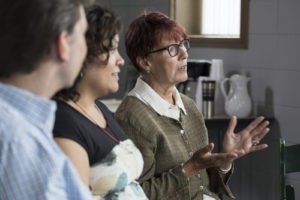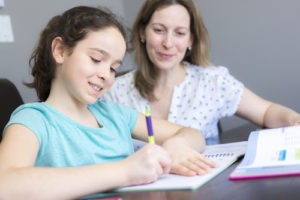These could take place in person, where everyone gets together to talk, or virtually using an online meeting.
Children and young people can and do go to meetings, and as they get older this is a good way for them to get involved in making decisions. Whether they go to the meetings or not, your child’s views should be at the heart of any discussions or meetings you have.

Most children and young people with SEND are in school or college. That means you should be meeting routinely and regularly with staff to see how things are going. The SEND Code of Practice says that schools should meet parents at least three times each year. Most parents do that and meet with staff once a term. But you might meet more often if things aren’t going well or if your child needs more support, such as in the first year of secondary school.
 These kinds of meetings are sometimes with the Special Educational Needs Co-ordinator (SENCO), assistant SENCO or class teacher. Other staff may also hold or be at a meeting, such as your child’s form tutor if they’re in secondary school. Sometimes other professionals might be invited, and your child or young person can go too if they’re able to and want to.
These kinds of meetings are sometimes with the Special Educational Needs Co-ordinator (SENCO), assistant SENCO or class teacher. Other staff may also hold or be at a meeting, such as your child’s form tutor if they’re in secondary school. Sometimes other professionals might be invited, and your child or young person can go too if they’re able to and want to.
Your child should have a school plan where all their needs and support are written down along with some outcomes. Outcomes are a bit like targets. They are about the difference the extra support should make for your child.
Meetings usually follow a pattern and most of the discussion often involves talk about your child’s plan. That means looking at and discussing each need and the support, seeing what’s going well and discussing whether anything needs to change. You’ll be able to share how things are at home and you’ll hear how things are going at school. This kind of meeting often takes about an hour.
This is the kind of meeting that many parents worry about and dread getting a request for. It could be about anything, so it’s important to find out what you’re going to be talking about before you go, so you don’t get any surprises. If it looks like it might be a difficult or challenging meeting, it can help to take someone with you for support.
It can be difficult to prepare for a meeting like this, but it makes sense to get as much information as you can before you go. If it’s about something that happened at school or college, get your child’s version of the events. Depending on the situation, it might help to talk to other parents or chat informally to your child’s TA or support staff. Ask who will be at the meeting and ask for an agenda too.
A TAC meeting brings together all the different services and professionals that are working with your child. Those at the meeting share information and make sure everyone is working towards the same goals. You can share how things are at home and ask for support and your child or young person can say what they think. The professionals should work with you to get the right support in place for your child.
 This kind of meeting is a bit like a standard ‘how is it going’ meeting, but there will probably be more people there and it might take longer. The meeting won’t just be about what is happening at school. It’s a look at the whole of your child’s life including home life, their activities outside home and school and planning for their future. Health and social care professionals may be at the meeting as well as staff from other support services and the school or college.
This kind of meeting is a bit like a standard ‘how is it going’ meeting, but there will probably be more people there and it might take longer. The meeting won’t just be about what is happening at school. It’s a look at the whole of your child’s life including home life, their activities outside home and school and planning for their future. Health and social care professionals may be at the meeting as well as staff from other support services and the school or college.
TAF meetings are about support for a whole family, not just a single child. So, they might include support for you and/or siblings as well as a child with SEND. It’s a bit like a team around the child (TAC) meeting, in that the adults caring for a child meet with the professionals involved in supporting them. If they want to, your child or young person can, and should, be at the meeting too.
TAF meetings should be about building on a family’s strengths to help them support their child and themselves. That means focusing on finding solutions and ways forward that are led by you, rather than being ‘done to’. Everyone at the meeting is usually working to a plan, and that is reviewed regularly. This is to make sure it’s working and to check if anything needs to change.
Health and social care professionals may be at the meeting as well as staff from other support services and the school or college.
If your child has an Education, Health and Care plan (EHC) plan it will be reviewed regularly. This is so that it can change when it needs to, as your child grows and their needs change. A review usually happens once a year. Sometimes it can happen earlier if lots has changed for your child or they’re really struggling at nursery, school or college.
For parents, the main part of reviewing an EHC plan usually happens at a meeting. This is where the people involved in supporting your child get together to talk about how things are going. This includes you and your child or young person and any professionals – including those in health and social care as well as education.
 At the meeting everyone will use the EHC plan, alongside yours and your child’s views. You should all talk about your child’s needs and support and whether any of that needs to change. Every EHC plan also has outcomes and these will be discussed too. Sometimes recommendations are made for them to be changed.
At the meeting everyone will use the EHC plan, alongside yours and your child’s views. You should all talk about your child’s needs and support and whether any of that needs to change. Every EHC plan also has outcomes and these will be discussed too. Sometimes recommendations are made for them to be changed.
Meetings usually last at least an hour, though this will depend on how much there is to talk about and how many people are at the meeting.
The process of the meeting and the way it’s managed can feel quite formal. Someone will be leading the meeting and there may be an agenda. There is likely to be a focus on the paperwork, including reports that may have been sent in. It can have quite a different feel to it, compared to a termly meeting with school staff.
Page reviewed: April 2024
Page due for review: April 2026
DiAS (Devon, Information, Advice and Support) supports children and young people aged 0-25 with special educational needs and disabilities (SEND), and their parents and carers.
Helpful links
Contact us
Legal
© 2025 Devon Information Advice & Support
Searching...